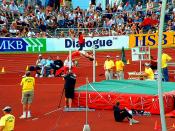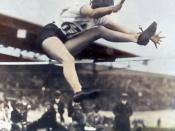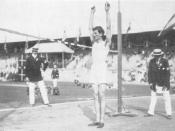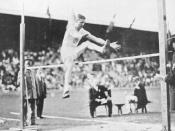Have we reached our limit? Have we reached our limit in time recorded sports.
Everyone knows every generation of athletes can run faster, jump higher, throw further etc. from the last but improvement in performance has either slowed or stopped. This is making people think we may have reached a physical limit.
John Hawley, a sports scientist said, before the Olimpic Games- "Physiologically, we've plateaued"ÃÂ Since 1956, the last time Australia hosted the Olimpics before last year, there has been a definate slowdown in the rate of improvement. For example- many of the athletes in 1984 and 1988 who won gold medals would still have be strong contenders, some maybe even favorites in 2000. An example of that would be the womens high jump. In 1956 the winning jump was 1.76 meters. By 1984 the gold medalist jumped 2.02 meters. The world record is now 2.05 but in 2000 the winning jump was only 1.96meters.
Apart from high jump where jumping techniques have inproved drasticly over these years athletics are basicly using the same techmiques used in 1956.
The things that have changed the records is the science behind it now but there is only s far science can stretch as well.
Nutrition didn't count in 1956. The athletes ate what ever they felt like and many of them believed that the best way to generate energy before their event was to eat heaps of animal products. Marlene Mathews, an Australian 100 meter sprinter in 1956 ate a piece of steak with a poached egg on top 4 hours before her race. Nutritionists these days would tell you that would have slowed her up a meter or so.
In 1956 most only trained in the summer and some only did even that part time. They had coaches but using physiologists, psychologists, biomechanists and nutritionists would have even entered their minds to help them race, which these days is a standard support team for an athlete.
They also hardly if not never worked with weights. Today it is a central part of the training. Rudolf Sopko, one of Australia's leading coaches in throwing events, says there has been a complete reversal on the emphasis in training over the past 40 years. Athletes once spent 70% of their training time practising and 30% in the gym, today it's the opposite.
Cycling and rowing have been improved by equipment. In cycling the big discovery was wind friction, they now crouch low, hips and shoulders now about level, disc instead of spoked wheels, wear aerodynamic helmets, ride synthetic bikes and hold arms together to cut through the wind. Since 1956 they're racing about 10 seconds faster. In rowing the boats are now synthetic, much lighter then the timber ones in 1956, the oars weigh half of what they did back then.
Sprinters in the pool have improved much more then sprinters on the track. Not because of better swimming techniques, although dives and turns have been a huge part of it. Foe example, Mark Spitz a star from 1972 tried to make a come back in 1992 and was a body length behind only after the dive. John Talbot a coach that has been there since 1956 says the big improvements have been the deeper water, bigger lane ropes effecting wash, smoother pools, softer water, changes in rules effecting turns but the massive advantage was knowing how to train them to produce there best.
Another question is is research going to far? Effectively we spent $48 million for each gold medal we won in 2000 on research on every aspect of an athletes performance. Is this money really well spent if the improvement has been so minimal over the last 40 years? Sure they have found out a lot over those years, for example, did you know that you don't provide carbohydrates within an hour of training it can take 6 days to replace the stores of glycogen (blood sugar) in the athletes muscles. This can make a big difference to performance. But is it going to far? Making a cut 3 times during a marathon in an athletes leg to see how much the tissue is changing during a run is even though it did improve times a bit.
Are we going to get to the stage where we will be getting muscle transplants, surgical enlargements of the heart, lungs and arterial systems or doing genetic engineering or cloning? We now know so much about the human body and it limits that we can't get something new to improve our athletes.
It has to stop somewhere and not many people or game to admit that it may be soon. There may sometimes be a millisecond faster but have we reached our limit? The most likely answer is yes.





